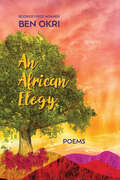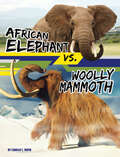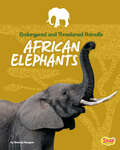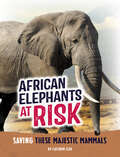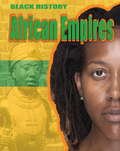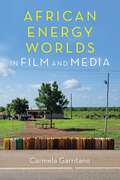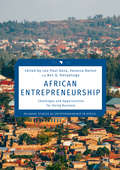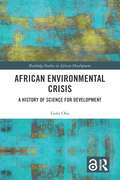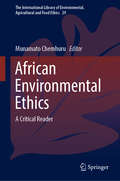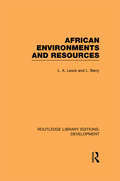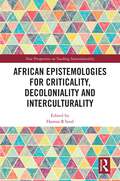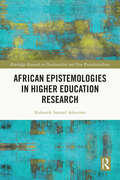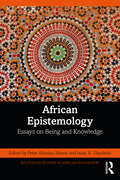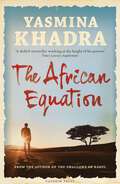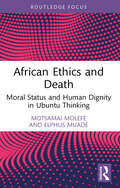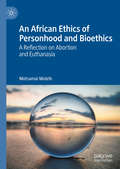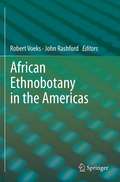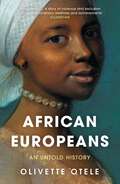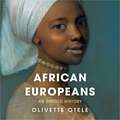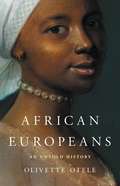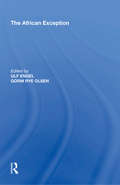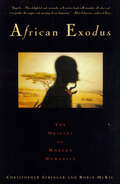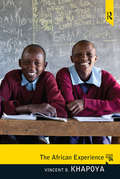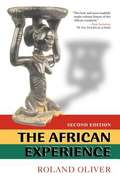- Table View
- List View
An African Elegy: Poems
by Ben OkriThis moving poetry collection from the Booker Prize–winning author finds strength and hope while reflecting on the complex issues that have burdened Africa.First published in 1992, Ben Okri&’s remarkable debut collection features poems that are now considered classics and taught in schools and universities worldwide. Here he plays with the mystique of the African continent, countering simplistic narratives of suffering that have been imposed on it with vibrant, nuanced portraits of the traditions and resilience of African peoples. An invaluable window onto Okri&’s experiences as a Nigerian immigrant to the United Kingdom and as a writer discovering his calling, these poems also speak to universal truths about love, injustice, and the search for meaning.
African Elephant vs. Woolly Mammoth
by Charles C. HoferIt’s a battle between two massive animals with treacherous tusks! The African elephant is today’s largest land animal. But thousands of years ago, the woolly mammoth used its gigantic tusks to defend against attackers. Learn what makes these similar fearsome creatures so powerful. Then decide which one would triumph in a battle.
African Elephants (Endangered And Threatened Animals)
by Brenda HaugenElephants are seen as a symbol of African wildlife. Many people admire their size, intelligence, and strength. But these great land beasts are in trouble. Their homes are disappearing and food is becoming hard to find. Learn more about these amazing animals, and what you can do to make a difference in their future.
African Elephants at Risk
by Kathryn ClayAfrican elephants have behaviors and features that keep them safe from predators, from the herds they live in to their large size. But these elephants are endangered. Because of humans, their habitat is shrinking, and climate change is hurting their food supply and their health. Human hunters are also putting these creatures at risk. Readers will learn why African elephants are at risk, what it means to be endangered, and how people can help. Each title includes activities and trivia questions to help readers connect with the content.
African Empires (Black History #5)
by Dan Lyndon-CohenThe history of the African continent covers thousands of years, thousands of kilometres and millions of peoples speaking hundreds of languages. There are countless stories, dances, poems and songs. They tell the history of the great ancient civilisations, such as the Egyptians; the powerful kingdoms in West Africa of Mali and Songhai; the trading cities of Timbuktu and Gao; and enormous structures, such as the pyramids and Great Zimbabwe. This book looks at the great civilisations of the African continent and the people within these complex societies.The Black History series brings together a wide range of events and experiences from the past to promote knowledge and understanding of black culture today.
African Enchantment
by Andrea BarryPatricia Wells had vowed to forgo romance and dedicate herself to her career as a dance therapist. But then--on vacation amid the lush beauty of Africa--she encountered Armand de Vincent, a wealthy Frenchman. He was wild--as exciting and dangerous as Africa itself, and from the start, she was determined to resist the mad pounding of her heart that his mere presence caused. But she found herself captive to his intense blue gaze. How could she allow herself to fall for such a playboy?
African Energy Worlds in Film and Media (New Directions in National Cinemas)
by Carmela GarritanoCan you imagine a post-petroleum world? African Energy Worlds in Film and Media joins energy humanists committed to undoing our deep dependence on fossil fuels and advancing equitable energy transitions by advancing this vision with a spotlight on African perspectives.African cinema is a rich and varied medium for investigating the entanglements and social embeddedness of energy with global modernity and for imagining a world that leaves fossil fuels behind for unrealized green energy futures. African Energy Worlds in Film and Media shows us how African cinema makes sensible the energetic aspects of life in the ecological mesh that is planet Earth and grounds us in the everyday of the postcolonial, bringing attention to the enduring legacies of racism and colonialism that unevenly distribute energy-related violence and risk and amplifying Africans' demands for access to the energy networks that undergird modernity. With a focus on feature, documentary, and arthouse films, including canonical films by Ousmane Sembène and Djbril Diop Mambety and new work by emergent directors Nelson Makengo and Djo Tunda Wa Munga, author Carmela Garritano examines how these stories depict an array of energy sources from mineral extraction to wind and the by-products of these energy processes, like plastic and electronic waste.Situated at the intersection of film studies, African studies, and energy humanities, African Energy Worlds in Film and Media analyzes the political, social, and economic dimensions of global energy forms and systems as represented in African cinema.
African Entrepreneurship: Challenges And Opportunities For Doing Business (Palgrave Studies Of Entrepreneurship In Africa)
by Vanessa Ratten Leo-Paul Dana Ben Q. HonyenugaExplores the cultural and historical influences to highlight how business in Africa represents a unique challenge.<P><P> Discusses the regulatory framework that helps and hinders business in Africa.<P> Examines the different types of entrepreneurship emerging in Africa including the changing conditions for female and ethnic entrepreneurs.<P>This book outlines the unique challenges and opportunities of doing business in Africa, analysing how varying degrees of development across its countries affects entrepreneurship. Taking into account historical and cultural contexts, the authors approach the topic by evaluating the different possibilities of business opportunity in Africa. Insightful contributions explore an extensive range of African countries, discussing both formal and informal entrepreneurship, as well as the different factors that influence the growing economy of Africa. African Entrepreneurship will be of interest to anyone researching the potential of doing business in Africa, as well as entrepreneurs and policy-makers looking to expand their knowledge on how businesses are managed in this region.
African Environmental Crisis: A History of Science for Development (Routledge Studies in African Development)
by Gufu ObaThis book explores how and why the idea of the African environmental crisis developed and persisted through colonial and post-colonial periods, and why it has been so influential in development discourse. From the beginnings of imperial administration, the idea of the desiccation of African environments grew in popularity, but this crisis discourse was dominated by the imposition of imperial scientific knowledge, neglecting indigenous knowledge and experience. African Environmental Crisis provides a synthesis of more than one-and-a-half century’s research on peasant agriculture and pastoral rangeland development in terms of soil erosion control, animal husbandry, grazing schemes, large-scale agricultural schemes, social and administrative science research, and vector-disease and pest controls. Drawing on comparative socio-ecological perspectives of African peoples across the East African colonies and post-independent states, this book refutes the hypothesis that African peoples were responsible for environmental degradation. Instead, Gufu Oba argues that flawed imperial assumptions and short-term research projects generated an inaccurate view of the environment in Africa. This book’s discussion of the history of science for development provides researchers across environmental studies, agronomy, African history and development studies with a lens through which to understand the underlying assumptions behind development projects in Africa.
African Environmental Ethics: A Critical Reader (The International Library of Environmental, Agricultural and Food Ethics #29)
by Munamato ChemhuruThis book focuses on under-explored and often neglected issues in contemporary African environmental philosophy and ethics. Critical issues such as the moral status of nature, African conceptions of animal moral status and rights, African conceptions of environmental justice, African relational Environmentalism, ubuntu, African theocentric and teleological environmentalism are addressed in this book. It is unique in so far as it goes beyond the generalized focus on African metaphysics and African ethics by exploring how these views might be understood differently in order to conceptualize African environmental ethics. Against the background where environmental problems such as pollution, climate change, extinction of flora and fauna, and global warming are plain to see, it becomes useful to examine how African conceptions of environmental ethics could be understood in order to confront some of these problems facing the whole world. This book will be of value to undergraduate students, graduate students and academics working in the area of African Philosophy, African Environmental Ethics and Global Ethics in general.
African Environments and Resources (Routledge Library Editions: Development)
by L. A. Lewis L. BerryFirst published in 1988, this work provides a comprehensive picture of the range of physical environments in Africa, focusing upon those characteristics and issues central to the management of environmental resources. Beginning with an overview of the geographical and environmental history of Africa, the authors also provide to the evolution of the management of resources and then details a broadly defined ecosystem approach, in which major environmental resource issues are identified and addressed in the tropical rainforest, the Savannah dry-forest, the arid and semi-arid areas, the highlands, and the extra-tropical zones of Northern and Southern Africa. The book is designed to contribute to a better understanding of African environmental and resource-management problems and this reissue should be welcomed by students of Africa and of environmental resource management problems in general.
African Epistemologies for Criticality, Decoloniality and Interculturality (New Perspectives on Teaching Interculturality)
by Hamza R'BoulThis book addresses the underrepresentation and, more importantly, the misrepresentation of African epistemologies and traditions of thought in making sense of, theorizing, and doing interculturality.Africa remains (probably) the most oppressed and silenced sphere throughout centuries of colonialism and contemporary coloniality. Therefore, such an anthology provides a platform for those insights that have substantial epistemic capacity to alter our taken‑for‑granted notions of what interculturality is and what it is about. While a number of works have charted the contributions of African epistemologies in advancing our understanding of our intercultural realities, this book argues that the processes of decoloniality through and within interculturality have never been about (under) (mis)representation per se, but about how the politics of representation can provide inaccurate, tokenistic, and false inclusion. This book aims to substantiate the notion that decoloniality and interculturality are mutually inclusive, to demonstrate the affordances of African epistemologies in advancing intercultural knowledge, and to support the need to make visible philosophical and power‑literate approaches to interculturality.This book will be essential reading for scholars and students interested in African philosophy, African epistemology, and, more broadly, interculturality and intercultural communication.
African Epistemologies in Higher Education Research (Routledge Research on Decoloniality and New Postcolonialisms)
by Kolawole Samuel AdeyemoBringing a needed perspective on African Epistemologies on the critical topics of higher education in relation to knowledge systems, this book highlights how knowledge creation processes influence higher education systems, society, and African development. This book uses an interdisciplinary approach to frame the connections between academic knowledge systems. Specifically, it seeks to answer questions on the trends in knowledge mobility, histories, and sociological dimensions in knowledge production in post-colonial Africa. The discussion explores how existing knowledge systems can better align with past and present narratives throughout African history and philosophies. The primary thought behind this book is to deconstruct the idea of a free market, the issue of corruption, racism and the neoliberalist approach to knowledge creation and transmission. Thus, it seeks to answer questions on the history and sociological dimensions of knowledge production in higher education. The book argues that African epistemologies can be better understood by investigating present sociologies and histories shaping African higher education research. Researchers and university students in the field of sociology of education, economics of education, higher education and policy will find this book very useful.
African Epistemology: Essays on Being and Knowledge (Routledge Studies in African Philosophy)
by Peter Aloysius Ikhane Isaac E. UkpokoloThis book investigates how knowledge is conceived and explored within the African context. Epistemology, or the theory of knowledge, has historically been dominated by the Western approach to the discourse of knowledge. This book however shines a much-needed spotlight on knowledge systems originating within the African continent. Bringing together key voices from across the field of African philosophy, this book explores the nature of knowledge across the continent and how they are rooted in Africans’ ontological sense of being and self. At a time when moves to decolonize curricula are gaining momentum, this book shows how understanding the specific ways of knowing that form part of the every day life of the African, will play an important part in rebalancing studies of philosophy globally. Employing critical, conceptual and rigorous analyses of the nature and essence of knowledge as understood by indigenous African societies, the book ultimately asks what could pass as an African theory of knowledge. This important guide to the connections between knowledge and being, in African philosophical thought, will be an important resource for researchers and students of philosophy and African studies.
The African Equation
by Yasmina KhadraKurt Krausmann, a recently bereaved Frankfurt doctor, is persuaded to join his friend, wealthy benefactor Hans Makkenroth, on a humanitarian mission to the Comoros. The journey helps him begin to confront his loss, but soon misfortune strikes again: the boat he and Hans are travelling in is hijacked in the Gulf of Aden and the men are taken hostage. Held in a remote hideout, the prisoners suffer harsh conditions and the brutality of their guards; self-styled warriors, ex-army captains and even poets drawn to banditry through poverty or opportunism. When the group decamps to a lawless desert region and Hans is taken away, Kurt sinks deeper into despair. But fellow inmate Bruno, a French ethnologist who has been travelling Africa for 40 years, attempts to show Kurt another side to the wounded yet defiant continent he has taken to his heart.
African Ethics and Death: Moral Status and Human Dignity in Ubuntu Thinking (Routledge Studies in African Philosophy)
by Motsamai Molefe Elphus MuadeThis book analyzes the concepts of moral status and human dignity in African philosophy and applies them to the moral problems associated with death. The book first challenges the criticism and rejection of moral status in African philosophy and then continues to consider how moral personhood is defined in African ethical theories, investigating which entities have full moral status or moral personhood and are therefore worthy of full ethical consideration. It then applies this theory to the problems associated with death. In the medical context, will an African theory of moral status permit or forbid euthanasia? Do we have moral obligations towards dead human bodies? Overall, the book provides an important African axiological contribution to debates on global ethics and moral philosophy. Providing an important overview of the ethical problems associated with the biological fact of death, this book will be of interest to researchers across the fields of philosophy and African studies.
An African Ethics of Personhood and Bioethics: A Reflection on Abortion and Euthanasia
by Motsamai MolefeThis book articulates an African conception of dignity in light of the salient axiological category of personhood in African cultures. The idea of personhood embodies a moral system for evaluating human lives exuding with virtue or ones that are morally excellent. This book argues that this idea of personhood embodies an under-explored conception of dignity, which accounts for it in terms of our capacity for the virtue of sympathy. It then proceeds to apply this personhood-based conception of dignity to bioethical questions, specifically, those of abortion and euthanasia. Regarding abortion, it concludes that it is impermissible since foetuses possess partial moral status. Regarding euthanasia, it argues that it is permissible for reasons revolving around avoiding the reversing of personhood. It also, though, minimally, touches on the questions regarding the mentally disabled and animals, to which it assigns lower moral status.
African Ethnobotany in the Americas
by Robert Voeks John RashfordAfrican Ethnobotany in the Americas provides the first comprehensive examination of ethnobotanical knowledge and skills among the African Diaspora in the Americas. Leading scholars on the subject explore the complex relationship between plant use and meaning among the descendants of Africans in the New World. With the aid of archival and field research carried out in North America, South America, and the Caribbean, contributors explore the historical, environmental, and political-ecological factors that facilitated/hindered transatlantic ethnobotanical diffusion; the role of Africans as active agents of plant and plant knowledge transfer during the period of plantation slavery in the Americas; the significance of cultural resistance in refining and redefining plant-based traditions; the principal categories of plant use that resulted; the exchange of knowledge among Amerindian, European and other African peoples; and the changing significance of African-American ethnobotanical traditions in the 21st century. Bolstered by abundant visual content and contributions from renowned experts in the field, African Ethnobotany in the Americas is an invaluable resource for students, scientists, and researchers in the field of ethnobotany and African Diaspora studies.
African Europeans: An Untold History
by Olivette OteleA Guardian Best Book of 2020 A History Today Book of the Year, 2020Renowned historian Olivette Otele uncovers the untold history of Europeans of African descent, from Saint Maurice who became the leader of a Roman legion and Renaissance scholar Juan Latino, to abolitionist Mary Prince and the activist, scholars and grime artists of the present day. Tracing African European heritage through the vibrant, complex, and often brutal experiences of individuals both ordinary and extraordinary, she sheds new light not only on the past but also on questions very much alive today - about racism, identity, citizenship, power and resilience. African Europeans is a landmark celebration of this integral, vibrantly complex slice of European history, and will redefine the field for years to come.
African Europeans: An Untold History
by Olivette OteleA Guardian Best Book of 2020 A History Today Book of the Year, 2020Renowned historian Olivette Otele uncovers the untold history of Europeans of African descent, from Saint Maurice who became the leader of a Roman legion and Renaissance scholar Juan Latino, to abolitionist Mary Prince and the activist, scholars and grime artists of the present day. Tracing African European heritage through the vibrant, complex, and often brutal experiences of individuals both ordinary and extraordinary, she sheds new light not only on the past but also on questions very much alive today - about racism, identity, citizenship, power and resilience. African Europeans is a landmark celebration of this integral, vibrantly complex slice of European history, and will redefine the field for years to come.(P) 2020 Hodder & Stoughton Limited
African Europeans: An Untold History
by Olivette OteleA dazzling history of Africans in Europe, revealing their unacknowledged role in shaping the continent Conventional wisdom holds that Africans are only a recent presence in Europe. But in African Europeans, renowned historian Olivette Otele debunks this and uncovers a long history of Europeans of African descent. From the third century, when the Egyptian Saint Maurice became the leader of a Roman legion, all the way up to the present, Otele explores encounters between those defined as "Africans" and those called "Europeans." She gives equal attention to the most prominent figures—like Alessandro de Medici, the first duke of Florence thought to have been born to a free African woman in a Roman village—and the untold stories—like the lives of dual-heritage families in Europe's coastal trading towns.African Europeans is a landmark celebration of this integral, vibrantly complex slice of European history, and will redefine the field for years to come.
The African Exception (Contemporary Perspectives On Developing Societies Ser.)
by Ulf EngelGovernance has become an important concept in the politics of African development. It is therefore a crucial concept for social science analyses focusing on Africa. In public discourse Africa's future is being shaped by a combination of external interventions backed by African elites who cooperate with the donors, whose understanding of the importance of 'good governance' they share. This groundbreaking book disentangles the analytical aspects of governance from its political and normative connotations. The 'African exception' - the difference in 'development' between Africa and other regions of the South - can be understood by analysis focusing upon the specific forms of governance played out in politics and economics. The perspective of neo-patrimonialism is crucial but not sufficient here. The first section of the book explores African governance in two functional spheres: the political realm and the economic. Section two looks at new areas of governance in Africa: violent social spaces, HIV/AIDS and entrepreneurial urban governance.
African Exodus: The Origins of Modern Humanity
by Chris Stringer Robin McKieA Choice Outstanding Academic BookA Library Journal Best Sci-Tech BookA New York Times Notable BookOnce in a generation a book such as African Exodus emerges to transform the way we see ourselves. This landmark book, which argues that our genes betray the secret of a single racial stock shared by all of modern humanity, has set off one of the most bitter debates in contemporary science. "We emerged out of Africa," the authors cont, "less than 100,000 years ago and replaced all other human populations." Employing persuasive fossil and genetic evidence (the proof is in the blood, not just the bones) and an exceptionally readable style, Stringer and McKie challenge long-held beliefs that suggest we evolved separately as different races with genetic roots reaching back two million years.
The African Experience
by Vincent KhapoyaUpdated in its 4th edition, The African Experience is the only interdisciplinary survey to examine this region of the world from geographic, linguistic, social, historical, and political perspectives. Drawing on research from all of the social sciences, this text captures Africa in its complex totality. The African Experience helps readers develop a comprehensive and critical understanding of Africa, one that allows them to grasp the regions internal dynamics and its evolving place in the world.
The African Experience
by Roland OliverThis masterpiece of scholarship and compression, the second edition of The African Experience, covers the entire span of human history across the African continent, from the earliest emergence of hominids in eastern and southern Africa up to the present day. Drawing on more than forty years of teaching and research, Professor Oliver arranges the book thematically, beginning with the human colonization of the different regions of Africa, the origins of food production, and the formation of African languages. The achievements of Ancient Egypt are placed in context with the developmentsin the rest of the continent, and the spread of Judaism, Christianity, and Islam - "peoples of the book. " The tradition of urban settlement is traced, especially in western Africa, as well as the emergence of large and complex societies formed by the interaction of pastoralists and cultivators in eastern and southern Africa. The extent and nature of slavery in Africa is fully discussed, together with the external slave trade and the caravan trade in precolonial times. This leads to an analysis of the strengths and weaknesses of African political systems and why, from the early nineteenth century onwards, these systems were unable to withstand political pressure from abroad and the ensuing colonization. The colonial partition of Africa saw the rapid amalgamation of small units, through which considerable modernization was achieved at the expense of the indigenous structures and through the exploitation of the African peoples. Later chapters describe the birth of modern African nation-states, at a time of widespread belief in state planning - now being questioned as the political elites of black Africa begin to review their single-party systems. This new edition sees a number of revisions, including a new chapter on the 1990s, when the end of the Cold War left Africa free at last to try to solve its own problems.
